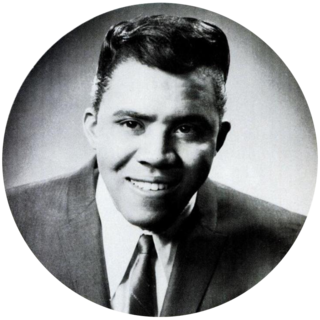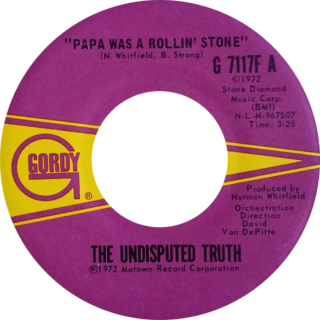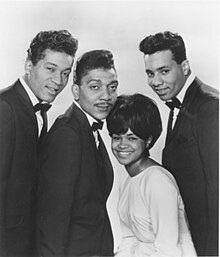
The Temptations are an American vocal group from Detroit, Michigan, who released a series of successful singles and albums with Motown Records during the 1960s to mid 1970s. The group's work with producer Norman Whitfield, beginning with the Top 10 hit single "Cloud Nine" in October 1968, pioneered psychedelic soul, and was significant in the evolution of R&B and soul music. The band members are known for their choreography, distinct harmonies, and dress style. Having sold tens of millions of albums, the Temptations are among the most successful groups in popular music.

Jimmy Lee Ruffin was an American soul singer, and the older brother of David Ruffin the lead singer of the Temptations. He had several hit records between the 1960s and 1980s, the most successful being the Top 10 hits "What Becomes of the Brokenhearted" and "Hold On ".

The Andantes were an American female session group for the Motown record label during the 1960s. Composed of Jackie Hicks, Marlene Barrow, and Louvain Demps, the group sang background vocals on numerous Motown recordings, including songs by Martha Reeves & the Vandellas, the Temptations, Stevie Wonder, the Four Tops, Jimmy Ruffin, Edwin Starr, the Supremes, the Marvelettes, Marvin Gaye and the Isley Brothers, among others. It is estimated they appeared on 20,000 recordings.
The Elgins were an American vocal group on the Motown label, active from the late 1950s to 1967. Their most successful record was "Heaven Must Have Sent You", written and produced by the Holland–Dozier–Holland team, which was a hit in the US in 1966, and in the UK when reissued in 1971.

"Papa Was a Rollin' Stone" is a song originally performed by Motown recording act the Undisputed Truth in 1972, though it became much better known after a Grammy-award winning cover by the Temptations was issued later the same year. This latter version of the song became a number-one hit on the Billboard Hot 100.

The Undisputed Truth was an American Motown recording act assembled by record producer Norman Whitfield to experiment with his psychedelic soul production techniques. Joe "Pep" Harris served as main lead singer, with Billie Rae Calvin and Brenda Joyce Evans on additional leads and background vocals.

Kim Weston is an American soul singer, and Motown alumna. In the 1960s, Weston scored hits with the songs "Love Me All the Way" and "Take Me in Your Arms ", and with her duet with Marvin Gaye, "It Takes Two".

Richard Allen Street was an American soul and R&B singer, most notable as a member of Motown vocal group The Temptations from 1971 to 1993. Prior to joining the Temptations, he had been a member of Otis and The Distants in the 50s, a vocal group that was led by Otis Williams.

"Smiling Faces Sometimes" is a soul song written by Norman Whitfield and Barrett Strong for the Motown label. It was originally recorded by the Temptations in 1971. Producer Norman Whitfield had the song re-recorded by the Undisputed Truth the same year, resulting in a number-three Billboard Hot 100 position for the group. "Smiling Faces" was the only Top 40 single released by the Undisputed Truth, and was included on their debut album The Undisputed Truth.
"War" is a counterculture-era soul song written by Norman Whitfield and Barrett Strong for the Motown label in 1969. Whitfield first produced the song – a self-evident anti-Vietnam War statement – with The Temptations as the original vocalists. After Motown began receiving repeated requests to release "War" as a single, Whitfield re-recorded the song with Edwin Starr as the vocalist, with the label deciding to withhold the Temptations' version from single release so as not to alienate that group's more conservative fans. Starr's version of "War" was a No. 1 hit on the Billboard Hot 100 chart in 1970, and is not only the most successful and well-known record of his career, but it is also one of the most popular protest songs ever recorded. It was one of 161 songs on the no-play list issued by Clear Channel following the events of September 11, 2001.

The Velvelettes were an American singing girl group, signed to Motown in the 1960s. Their biggest chart success occurred in 1964, when Norman Whitfield produced "Needle in a Haystack", which peaked at number 45 on the Billboard Hot 100, and number 27 in Canada.

"Superstar (Remember How You Got Where You Are)" is a 1971 hit single for the Gordy (Motown) label, recorded by The Temptations and produced by Norman Whitfield. Something of an early ancestor to the "diss songs" prevalent in hip hop music towards the end of the 20th century, "Superstar" is an attack at two former Temptations members, David Ruffin (who had been fired back in 1968) and Eddie Kendricks (who quit the act in early 1971 and negotiated a Motown solo deal). The song appears on the 1972 album Solid Rock.

Greetings! We're The Monitors is the debut album by The Monitors, released in 1968.
Motorcity Records is a British record label formed by producer Ian Levine in 1989. The label aimed to record new material with former Motown artists.
William L. Griffin is an American singer and songwriter. He replaced Smokey Robinson as the lead singer of The Miracles in 1972.
The Sisters Love was an American R&B and funk ensemble active in the late 1960s and early 1970s.
Joe Stubbs was an American R&B/soul singer who became the lead singer of four different groups throughout his recording career. He was the younger brother of The Four Tops' lead Levi Stubbs.
"Law of the Land" is a soul song written by Norman Whitfield for the Motown label. A socially conscious funk track with elements of early disco music, it details the rules of human society that people have to accept and live by.
"Say You" is a 1965 soul song, written by Robert Dobyne, Robert Staunton and Charles Jones, and recorded by both The Monitors, who had a charting R&B Hit with the song, and The Temptations.
"Greetings (This Is Uncle Sam)" is a 1961 song recorded by three American R&B music groups, The Valadiers, The Monitors, and The Isley Brothers for the Motown label. It was written by Robert Bateman, Brian Holland, Stuart Avig, Martin Coleman, Art Glasser, Jerry Light, P Bennet, Lawrence Horn and Ronald Dunbar. (Avig, Coleman, Glasser and Light were members of the Valadiers.) The Isley Brothers version was shelved while the Valadiers' and Monitors' versions give both groups their first and only charter on the Billboard Hot 100 charts and became the biggest "hit" for each; both groups could only archive very minor hits due to non-promotion.











